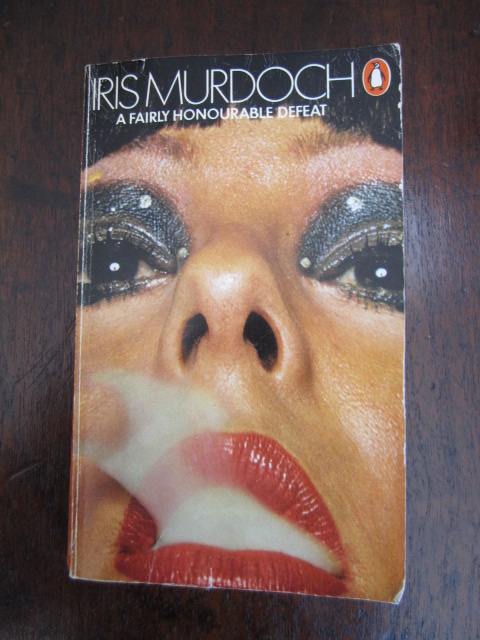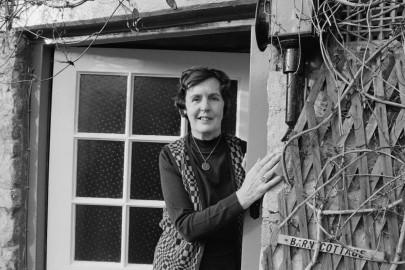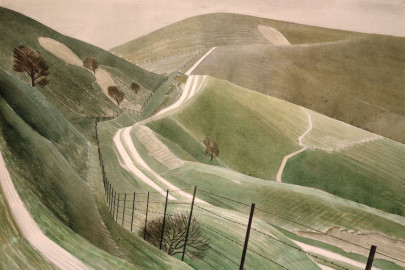The strange ways of internet commerce mean that countless secondhand books can be bought online for £0.01 plus postage. Today ZMKC turns up an interesting title.
A Fairly Honourable Defeat (available here for a penny) is the first Iris Murdoch I’d read. It was published in 1970 (and yet, amazingly, contains a reference to someone working on something called the ‘Computer Forecast Working Party’ – I had no idea computers had even been thought of all that time ago, let alone percolated down, if only as a concept, to middle class London, which is the novel’s milieu). It appears to be some kind of reworking of the kind of Shakesperian comedy in which a mischievous spirit leads people astray for fun, confusing them about who they love and so forth.
The novel opens with 20-odd pages of straight dialogue, which is quite a daring way to begin a novel. Unfortunately, the experiment is ‘brave’, as Sir Humphrey would say, rather than particularly successful, partly because Murdoch has to burden it with slabs of exposition, which make the conversation flow in an unnaturally orderly way, rather than meandering about with endless broken sentences and countless digressions, as actual speech tends to do.
Similarly, while Murdoch’s characterisation (notable for its unusually detailed visual descriptions; she supplies us, in a slightly Constable Plod kind of way, with hair colour, height, eye colour and even, bafflingly, in one case, something she designates as a ‘slightly prissy mouth’), is admirably fertile and inventive, the structure of the novel creaks a fair bit. She creates seven very vivid main characters but then proceeds to shove them in and out of situations that, while they highlight the points she wants to make about the nature of good and evil, love and illusion and humanity itself, do not entirely convince.
The book contains some good insights and is remarkably advanced about homosexuality (possibly the most sympathetic of the characters are the homosexual couple). At moments – for instance, when we are told of one character, ‘He sat down on the divan bed and began to pick his nose’ – it takes realism to extremes I have not encountered before.
It has some wonderfully comic moments – including a farcical sequence involving the disposal of a large pink teddy bear. The figure of Tallis’s father, who, when he says to his son, ‘I wish you were five again. I’d give you something. Not that beating ever did you any good. But my God I enjoyed it,’ reminded me of Dudley Moore as the angry working-class father telling his effete son, Peter Cook, never to darken his own doorstep again, is consistently amusing, (I particularly like it when he tells his son he should get a shave, because, ‘you look like something growing on the side of a tree trunk.’)
However, too much is left to the reader’s kind indulgence, particularly when it comes to putting up with the idiotic pseudo-mystical thread that runs through the text. The final revelation of terrible violence hidden in the past of two characters is probably meant to be shocking, but I found it merely gimmicky.
All in all, the book, though entertaining, is flawed and has, somehow, a hollow ring. I suppose it could therefore be described as a rare example of honesty in advertising. After all, the title tells any prospective reader the absolute truth: as a piece of fiction this novel is a fairly honourable defeat.












Thanks for the review Z, I had been meaning to read this book, but may not bother now; I’ve read the sea, the sea, the bell and the sandcastle and loved them due to murdoch’s excellent characterisation and ability to realistically portray a whole range of human vices ( I especially liked the character Mor in the sandcastle as she nails the foolish middle-aged male ego so brilliantly)
Thank you Z and Worm. I’d not ready any Murdoch and have wondered, on and off, where to start. Maybe with The Sandcastle.
Interesting, this early awareness of computers – they’d existed since World War II, of course, but Z is right to say most people were hardly aware of them. But they were certainly on my radar by 1970 because my school (a provincial grammar school) had one. It was a cast-off from a local company and the school’s head of Maths cannily acquired it. He taught himself to program it and worked out the school’s timetables on it, and also allowed people who did Maths in the 6th form to use it. I was never going to do A Level Maths, so never got near the thing, but there it was, filling a large part of a small room and a small part of my consciousness.
Was it one of those computers with the tickertape with holes in it Philip? Our science teacher had one; of course by this time we thought we were terrifically advanced in comparisson with our BBC acorn computer, with a massive 32kb of ram!
And regarding computers, what about Charles Babbage’s ‘analytical devices’ – dreamt up in 1812!
back to Murdoch, I certainly recommend The Sandcastle, a quick and jaunty read containing plenty of comedy and characters. The Bell is in a similar style too.
I picked up some others by her when I was at the secondhand shop in Goulburn, Worm, so may move on to some of your favourites eventually and write about them too.F or me, although she is good at making up lots of characters and is quite fun to read, there is something a bit held in, almost academic or schematic about her writing – she doesn’t let go completely. Somewhere, the Australian poet Les Murray talks about front brain and back brain writing (I’ve probably got the terminology wrong, but something like that) – he says writing from the front brain is fine, but it lacks the strangeness and surprise of writing from the back brain. The theory sounds a bit mad, but I sort of know what he means, and I think Murdoch couldn’t quite bring herself to take the leap towards the back brain (somehow I can’t help thinking about that Saki story, The Lumber Room, as I write that.)
Philip – I remember announcing firmly to everyone in my office that I was never, ever going to use ‘that Internet thing’. I thought it would be so complicated and boring and involve having to learn dull technical things. The first time I saw a computer was in 1983 – it was the domain of a terrifying woman of about 60 who’d just been widowed and was trying to give up smoking. I think these factors, plus the fact that she didn’t want anyone to know she had very little grasp of how the thing worked, meant that she was extremely possessive of her rights over the machine. No-one else was allowed to touch it. Apparently it was very temperamental and very few of the things we were hoping it would do were within its capabilities, which meant, for instance, that we continued to send out letters addressed to people who had died several years ago et cetera. It did not immediately bring the things our boss referred to as ‘efficiency dividends’, although he saw those as its main attractions.
“For me, although she is good at making up lots of characters and is quite fun to read, there is something a bit held in, almost academic or schematic about her writing – she doesn’t let go completely.”
agree entirely with your summary! But I quite like the dryness, perhaps its the english in me, I’m always terrified of opening a book and being assaulted with excruciatingly naked emotions
“Schematic” is the word. A Severed Head is almost a parody of Murdoch’s change partners method:-
Hero has a Mistress
Hero’s Wife leaves him for Friend
Hero falls for Friend’s Sister
Hero catches Friend and Friend’s Sister in incestuous act
Hero’s Friend dumps Hero’s Wife
Hero’s Mistress runs off with Friend
Hero’s Wife runs off with Hero’s Brother
Hero ends up with Friend’s Sister
As zmkc says, the characters’ looks are closely described as are rooms, clothes and the countryside, often evocatively – but the books lumber from static scene to static scene. There are enjoyable set pieces but there is not much momentum, and often the characters’ actions seem to be arbitrary.
I liked her novels The Black Prince and Under The Net. Not so keen on The Bell and The Sea, The Sea.